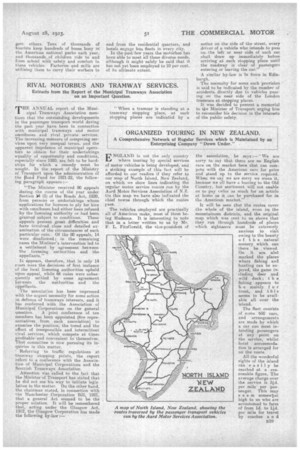RIVAL MOTORBUS AND TRAMWAY SERVICES.
Page 23

If you've noticed an error in this article please click here to report it so we can fix it.
Extracts from the Report of the Municipal Tramways Association on an Important Question,
THE ANNUAL report of the Municipal Tramways Association mentions that the outstanding developments in the passenger transport world during the past year have been in connection with municipal tramways and motor omnibuses and rival private services. The increasing measure of competing services upon very unequal terms, and the apparent impotence of municipal operators to obtain for their undertakings equality of opportunity and conditions, especially since 1920, are, felt to be hardships for which a remedy must be sought. In the report of the Ministry of Transport upon the administration Of the itoad Fund for 1921-22, the following paragraph appears ;—
" The Minister received SO appeals during the course of the year under Section 14 (3) of the Roads Aet, 1920, from persons or undertakings whose applications for licences to ply for hire with omnibuses had either been refused by the licensing authority or had been granted subject to conditions. These appeals present great difficulties and have involved close and detailed examination of the circumstances of each particular case. Of the SO appeals, 14 were disallowed; in the remaining cases the Minister's intervention led to a settlement by agreement between the licensing authorities and the appellants."
It appears, therefore, that in only 14 cases were the decisions of first instance of the local licensing authorities upheld upon appeal, while 66 cases were subsequently settled by some agreement between the authorities and the appellants.
The association has been impressed with the urgent necessity for some action in defence of tramways interests, and it has conferred with the Association of Municipal Corporations on the general
question. A joint conference of ten members has been appointed (five representatives from each association) to examine the position; the trend and the effect of irresponsible and intermittent rival services, which compete at times profitable and convenient to themselves. That committee is now pursuing its inquiries in this matter.
Referring to traffic regulations at tramway stopping points, the report refers to a conference with the Association of Municipal Corporations and the Scottish Tramways Association.
• Attention was called to the fact that the Minister of Transport has stated that he did not see hi a way to initiate legislation in the matter. On the ether hand, the chairman stated, in connection with the Manchester Corporation Bill, 1921, that a general Act seemed to be the proper solution. It will be remembered that, acting under the Glasgow Act, 1912, the Glasgow Corporation has made the following by-law:— "When a tramcar is standing at a tramway stopping place, as such stopping places are inditafed by a notice on the aide of the street, every driver of a vehicle who intends to pass on. the left or near side of such car shall draw up immediately before arriving at such stopping place until
• the -roadway is clear of passengers
entering or leaving the car.'
A similar by-law is in force in Edinburgh.
The necessity for some such provision is Said to be indicated by the number of accidents. directly .due to vehicles passing on the near side of the London tramcars at stopping places.
it was decided to present a memorial to the Minister of Transport urging him to reconsider his decision in the interests of the public safety.




























